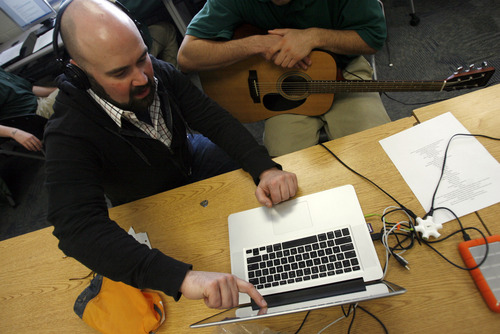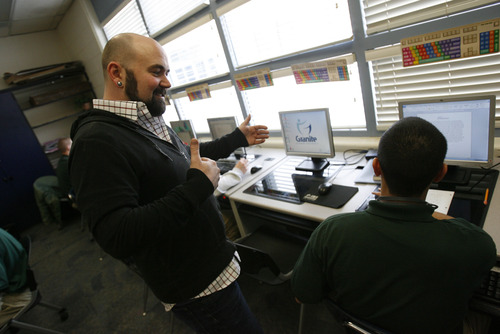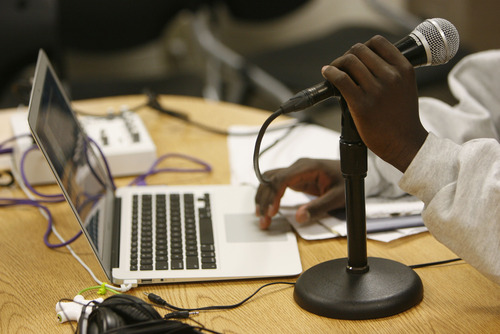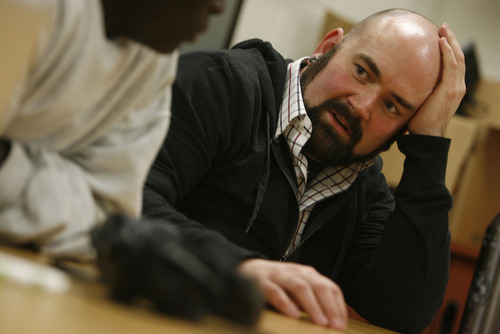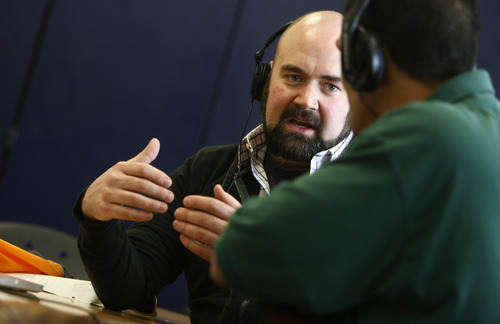This is an archived article that was published on sltrib.com in 2013, and information in the article may be outdated. It is provided only for personal research purposes and may not be reprinted.
West Valley City • Pieces of recording equipment are scattered around 18-year-old "Chance" as he leans over a laptop and hits play. He's about to preview his latest and nearly finished piece, "Lean On Me." The teen listens critically, searching for possible flaws.
This rap, after all, details an intensely personal part of his life. It tells the story of Chance's boyhood visits to his incarcerated mother, untouchable behind the jail's thick glass window.
His mother has since died. But now Chance sits behind a similar glass divide when his siblings come to visit him at the Decker Lake Youth Center. He raps about his fears that they will one day follow in his footsteps and the cycle will be repeated.
As the chorus kicks in, the voice of Chance's mentor, Adam Sherlock, melds seamlessly with his protege's, giving the song added depth.
Every week for the past 3 1/2 years, Sherlock has helped youths like Chance record their struggles and life experiences in poems, songs, essays and interviews for a podcast called "Sending Messages." (Chance chose that name especially for the podcast to protect his identity; The Salt Lake Tribune also does not typically name juveniles charged with crimes.)
Each episode of "Sending Messages" revolves around a certain theme such as trust, redemption and family. In one episode, a 17-year-old describes tonelessly the beatings he received from an adoptive father, who then bribed him with video games to keep quiet. Another describes his heroin addiction. Most subjects are fair game, although profanity is banned.
Souls are laid bare in many of their works. A teen known as "The Unknown" wrote this:
"Living in depression is just like living in a nightmare. ... The nightmare never ends as long as you are breathing. The fear that we live in is so intense that some of us make way to cease breathing. We call the reaper to our doorstep and invite it in.
"The scariest thing my dad has ever said to me is, 'The reaper is never very far away, all you need is a robe,' and held one up. It's scary not only because he said it, but because he followed through about seven months later."
—
Making their voices heard • The podcast, said Sherlock, a radio documentary instructor with the Salt Lake City non-profit Spy Hop Productions, allows kids to talk about "usually pretty serious stuff from their lives." It's the only program in the country that's completely produced and recorded inside a juvenile detention center, he noted.
In January, "Sending Messages" was honored with the American Probation and Parole Association's (APPA) Community Awareness Through Media Award.
"These voices are not often heard in such a raw state, and by gaining an audience, these youth can feel that their stories are valid and have worth," the APPA wrote.
More than 10,000 people download the podcasts on iTunes or sendingmessages.org, Sherlock said. Episode No. 32 was released in early February.
"Every student I've had has really loved [the program]," he said. "It's been a big part of their lives."
The youths' clips have been featured at their own funerals and heard by probation officers, juvenile judges, friends and family members.
The program recently expanded beyond the walls of Decker Lake Youth Center into the Wasatch Youth Center and Cornerstone Counseling Center, said Kasandra VerBrugghen, executive director of Spy Hop Productions, which mentors youths in Utah in digital media arts. "Sending Messages" is supported through donations, fund-raising and local and national grants like one from the National Endowment for the Arts. It costs about $70,000 each year to provide the program at the three locations, she said.
"We really saw such a great response from the young people at Decker [Lake], and we really wanted to be able to expand it beyond Decker," VerBrugghen said. "It's been such a cathartic experience for a lot of those youth. It helps them make sense of their past and their future. We really just found the radio podcast [was successful] because they could use an alias, [and] it was just a really great way they could utilize their digital story-telling skills."
—
'Relaying the struggle within' • About eight young men are currently enrolled in Sherlock's program at Decker Lake, a long-term secure juvenile facility run by the state that houses serious and habitual delinquent youths.
Most of the youths chosen to participate in "Sending Messages" have earned a coveted slot through a privilege-based system. In return, they gain English credit and the opportunity to get multimedia experience.
"Hatter," an 18-year-old who raps, chose that moniker because his initials spell out "MAD," (as in the character Mad Hatter). He hopes one day to own his own record label, and said his pieces are "just relaying the struggle within myself." Writing for the podcast helps him get his mind straight and work through issues. "It would have made being locked up a while ago a lot easier," he said.
Chance, whose name reflects his view that every day is a gamble, said the program provides therapeutic release.
"I felt like my anger was a cobra and every time it strikes at people, it made me feel good," he said. "When I share stuff through music, it's better than sitting in front of somebody for an hour [at counseling]."
But that's not its only value, said a statement provided by Susan Burke, Utah's Juvenile Justice Services director.
"This innovative program provides youth an opportunity to express their feelings in a positive and creative manner while at the same time building their self-esteem and communication skills," said Burke, who also chairs the APPA's award committee.
Sherlock, who has a background in corrections and mental health, combined with amateur radio experience, said some teens come into the class not knowing exactly what it's all about.
"A lot of kids think it's just a rap class, and they'll come in and talk about how they're such a baller," Sherlock said, adding that pop culture makes it sound romantic to live fast and die young. "It sounds romantic until you end up in a place like this," he said, as Chance and Hatter nodded.
Chance said every piece is dissected and discussed word-by-word before it's ever recorded, which can feel like torture. But by the end, Chance said he often has learned something new about himself.
Both Chance and Hatter said they hope the program touches others struggling with similar problems and changes the perception that all incarcerated youths are violent, bad people. Rather, the teens said, they are simply trying to overcome life struggles like many others.
"There [are] other people that are going through the same thing they are," Sherlock said."Sometimes it helps to know that."
Twitter @sltribjanelle —
In their own words
Listen to the podcast "Sending Messages," which features the voices of incarcerated Utah youths • http://www.sendingmessages.org


